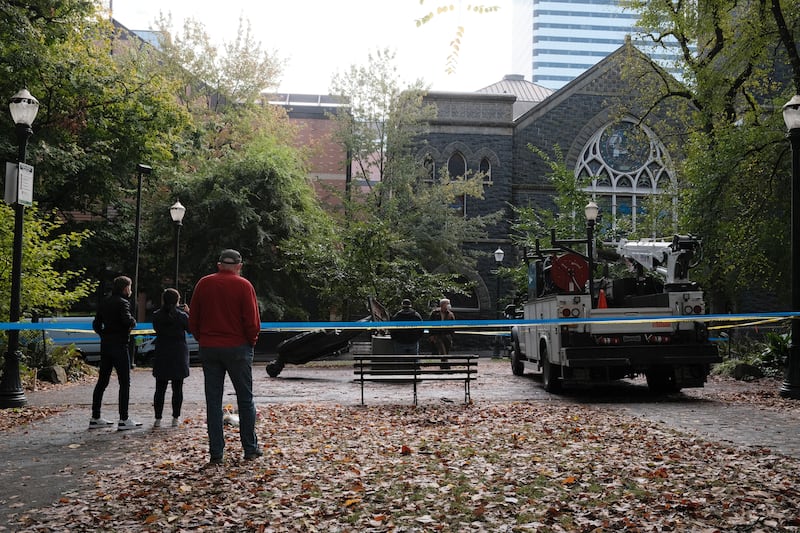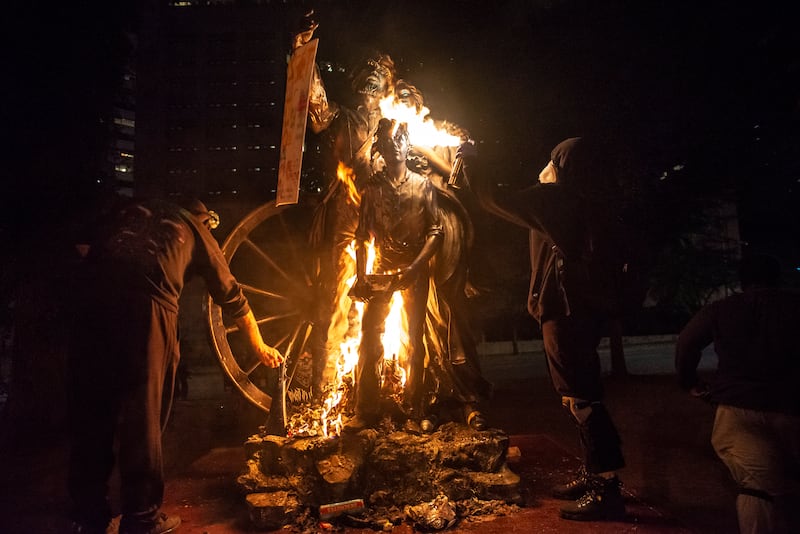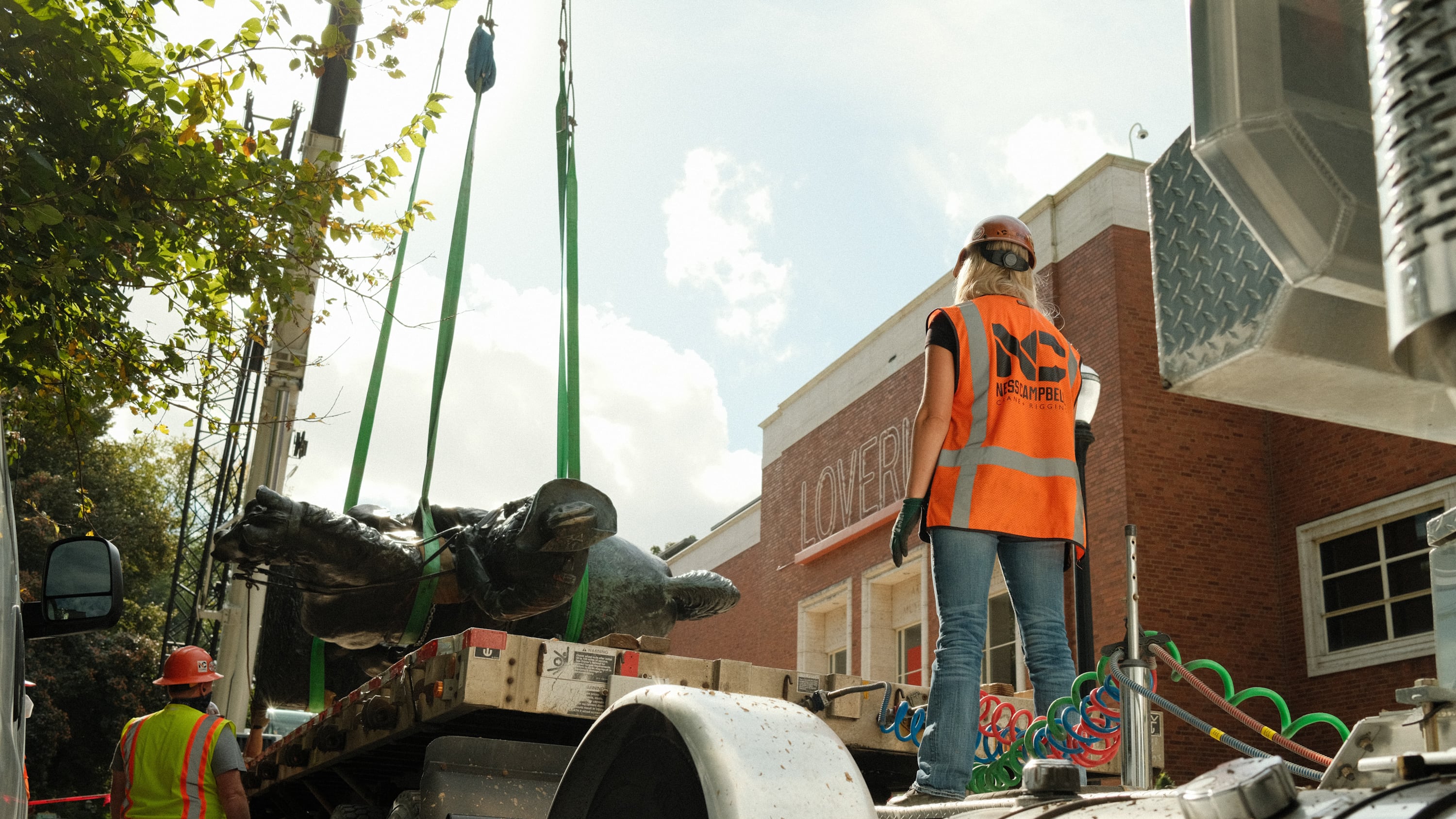Last summer and fall, protesters toppled Portland statues depicting three U.S. presidents: George Washington, Abraham Lincoln and Theodore Roosevelt.
Last month, local authorities quietly adopted a policy that could ensure the statues stay down.
Regional curators adopted a policy that says public artworks can be removed if the “subject or impact of an artwork is significantly at odds with values of antiracism, equity, inclusion.” There’s a strong chance the presidents won’t pass muster.

The policy: On May 5, the board of the Regional Arts and Culture Council amended its policies on adding and withdrawing public art. RACC, a nonprofit, contracts with Portland City Hall and Multnomah County to collect and maintain government-owned artworks, including statues. It’s also in charge of removing (or “deaccessioning”) such artworks from public collections, under certain circumstances.
The policy change RACC’s board approved last month expands those circumstances. It says artwork that’s at odds with antiracism can be removed. Same goes for art that becomes a rallying place for “gatherings centered on racist or bigoted ideology.”
RACC can also decide to get rid of public art if it becomes the target of “overwhelming public objection” for at least two years. That means if enough people vandalize a work with “social justice oriented graffiti,” that can be reason to remove it from the public collection.
Perhaps most noteworthy: The RACC board extensively rewrote its policy around public monuments—that is, statues honoring revered historical figures.
“Public art in the form of historic monuments and memorials in these spaces frequently depicts figures or events seen through the lens of privilege, failing to recognize the nuance of history that contains dispossession, enslavement, and discrimination,” the new policy says. “The legacy of the people or events depicted can change over time and it is therefore imperative that these artworks be regularly reevaluated, taking into account new information that comes to light during research or based on the evolution of a changing community.”
Kristin Calhoun, RACC’s director of public art, says the board made the policy changes in direct response to racial justice protests over the past year that, across the nation and in Portland, often included the toppling of monuments honoring historical figures who contributed to oppression. “There was nothing in the existing policy that addressed a moment like we’re in now,” she says.

Why it matters: In June 2020, several dozen people pulled down a statue of George Washington from a pedestal at the intersection of Northeast 57th Avenue and Sandy Boulevard. Four months later, following a protest dubbed “Indigenous People’s Day of Rage,” people tore down statues of Abraham Lincoln and Theodore Roosevelt that stood along the Park Blocks.
The statues have remained in city storage since they were toppled. All three could run afoul of the new standards RACC has adopted.
Washington was a slave owner. Roosevelt espoused eugenics and led imperialist wars. And Lincoln, while chiefly remembered for the Emancipation Proclamation, held racist views of Black people and presided over the removal of Native Americans from their land.
(All three presidential monuments were donated to the city by the same patron: Henry Waldo Coe, a turn-of-the-century physician whose removal of Native Alaskans to his mental institution has itself come under scrutiny. At last one person objected in February to a national historical designation of the Park Blocks, because of Coe’s gift to the city.)
Lincoln and Roosevelt face an additional hurdle: New designs for the Park Blocks may not have room for them.
Jeff Hawthorne, arts program manager for the city, says RACC also preemptively removed a fourth statue, The Promised Land, that featured a pioneer family in Chapman Square, after it was burned and sprayed with graffiti decrying it as colonialist.
Hawthorne says local officials haven’t determined the four statues’ fate. “We need to review all of the possibilities of what could be the ultimate disposition of George Washington or any of those sculptures,” he says. The possibilities include keeping them in storage, or repairing them and displaying them somewhere else—like in a museum—where they could be presented with context about why they’re controversial and what happened in the summer of 2020.
The idea that Abraham Lincoln was too racist to honor now is hardly a consensus view. But don’t expect tribunals for the presidents. While RACC plans to present its new policy to the Portland City Council this summer, it doesn’t plan to hold public hearings on each statue’s fate.
Calhoun says the nonprofit is seeking input on wider questions. “How do we have a public realm where everyone feels represented and safe and seen and heard? What does that look like?” she asks. “Even: Do you want monuments? Not everybody does.”
